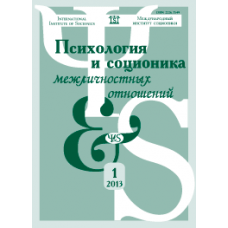Номер № 1/2013 журналу «Психологія та соціоніка міжособових відношень»
Дослідження
Єлфімова М.М., Мельникова Д.В.
Міфологічна складова Я-образу вчителя
Декларовані ідеали та педагогічні теорії, якими б якісними вони не були, неминуче стикаються з самосвідомістю педагога, який вносить у них свій інтерпретаційний зміст, підлаштовує їх під свою систему цінностей та уявлень про себе, щоб не порушити вже побудовані стратегії взаємодії зі Світом. Вчитель, безпосередньо організовуючи навчальний процес, створює низку умов специфіки проявів свого «Я». Це впливає на ефективність взаємодій у діаді «Учитель — Учень». Стаття присвячена дослідженню структурно-змістовних особливостей «міфологічного образу Я» вчителя, що визначають специфіку стилю його міжособистісної взаємодії у системі «Учитель-Учень». Дослідження дозволило виявити варіативність змістовних характеристик «міфологічного образу Я» вчителя, які вносять свої корективи в реалізацію моделі міжособистісної взаємодії (стилю) з учнем, а так само як «міфологічний образ Я» та його структурно-змістовні особливості визначають стиль взаємодії між вчителем та учням.
Ключові слова: міф, «міфологічний образ Я», архетип, стиль міжособистісної взаємодії. Ельяшевич А.М. успішне практичне застосування, автор проводить порівняльний аналіз між основними положеннями теорії психологічних типів К. Юнга та сучасним підходом методів соціоніки. Висувається гіпотеза про неможливість ідентифікації «чистого» ТІМу. Враховуючи два шляхи розвитку (самореалізація та адаптація), сильну і слабку функцію людини, автор розглядає спосіб досягнення великих успіхів особистості. , критерій відмінностей, психічні функції, самопізнання, саморозвиток.
Ментальність етносів
Овчаров А.А.
«Чоловіче» та «жіноче» у національній психології
Описані детермінанти «чоловічого» та «жіночого» у різних етносах Заходу та Сходу. Виділено країни з переважно маскулінними та переважно фемінінними культурами, розглянуто гендерні соціальні ролі в них.
Ключові слова: гендерні ролі, маскулінність, фемінінність, соціум, групова мораль, стереотип поведінки, ментальність етносу.
Гіпотези
Стукас В.А., Унтилова Е.А.
Юнгівська типологія та принцип додатковості
У статті розглядається принцип додатковості Нільса Бора з погляду його універсальності та стосовно юнгівської психологічної типології. Затверджується та демонструється відповідність фізіологічної моделі Т у соціоніці принципу ймовірнісної організації системи «середовище-психіка».Ключові слова: , мікрооб'єкт, модель А та модель Т у соціоніці, випереджаюче відображення, принцип додатковості, психічні функції, психологічний тип, вирішальні функції, екстраверсія. Мстислав Добужинський
Застосування методу контент-аналізу дає можливість визначити тип інформаційного метаболізму російського художника Мстислава Добужинського як логіко-сенсорний екстраверт (ЛСЕ). художня творчість.
Класика
Аугустинавічюте А.
Чому Юнга важко читати?
Описано особливості мислення К.Г.Юнга, який створив типологію особистості як логіко-інтуїтивного інтроверта.
Ключові слова: типологія К.Г.Юнга, типи особистості, соціоніка, психологія.
Наприкінці номера
Білецький С.А.
Казка про соціоніка, або Соціоніка в лисах
Повість-казка, в якій показано процес відкриття власного соціонічного типу. Уважний читач розпізнає у героях казки соціонічні типи, а характерних особливостях героїв — прояви та роботи функцій моделі А і дихотомічних ознак. Також у казці відображено інтертипні відносини та інші соціонічні закономірності. Наприкінці автор проводить соціонічний аналіз казки.
Ключові слова: соціоніка, психологія, тип особистості, інтертипні відносини, розвиток особистості, самопізнання.
Зміст журналу за 2012 рік Про авторів
Summary
Психологія та соціоніка 1/2013
- Модель: выпуск журнала «Психология и соционика…»
-
$3.00
- Ціна в бонусних бали: 30

